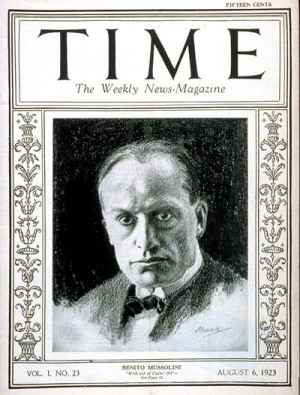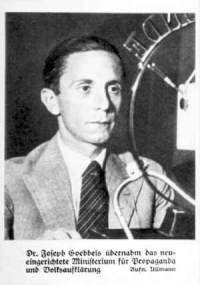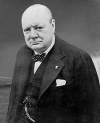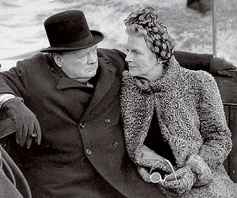
April 6

1853 Birth: Emil Jellinek: a Jewish entrepreneur who commissioned engineer Wilhelm Maybach to design the first Mercedes automobile, named after Jellinek's daughter, is born in Leipzig, Germany. [For further details, Click here]
1878 Birth: Erich Muehsam a German-Jewish anarchist, writer, poet, dramatist and cabaret performer. Both a prolific poet, dramatist and a Bohemian intellectual, Muehsam emerged at the end of World War I as one of the leading agitators for a federated Bavarian Soviet Republic. However, Muehsam achieved international prominence during the years of the Weimar Republic (1919-1933) for works which satirized Adolf Hitler and condemned Nazism before Hitler came to power in 1933. Muehsam specifically targeted his writings to satirize the growing phenomenon of Nazism, which later raised the ire of Adolf Hitler and Joseph Goebbels. Die Affenschande (1923), a short story, ridiculed the racial doctrines of the Nazi party, while the poem Republikanische Nationalhymne (1924) attacked the German judiciary for its disproportionate punishment of leftists while barely punishing the right wing participants in the Putsch. In 1930, Muehsam completed his last play Alle Wetter (All Hang), which sought mass revolution as the only way to prevent a radical Right-wing seizure of power. This play, never performed in public, was directed exclusively at criticizing the Nazis who were on the rise politically in Germany. An official Nazi report dated July 11, 1934 stated that Erich Muehsam committed suicide, hanging himself while in "protective custody" at Oranienburg.
1890 Birth: Anthony Fokker--in Java:
When Fokker was twenty-years old he started an aviation company in Wiesbaden, Germany. His first aircraft, Spin I, made a couple of 100 yard flights at the beginning of December, 1910. However, later that month it crashed into a tree and was destroyed. His second aircraft, Spin II, also crashed in May, 1911. His third effort, Spin III, was more successful and in 1913 was purchased by the German military authorities.
On the outbreak of the First World War, Fokker began work on a new single-seater fighter plane. Fokker was convinced that it was vitally important to develop a system where the pilot could fire a machine-gun while flying the plane. His solution to this problem was to have a forward-firing machine-gun synchronized with the propeller. . . .
[Fokker’s] synchronized machine-gun was fitted to the Fokker E aircraft. Two other models, the EII and the EIII, that differed in engine-power and wing size to the EI, began arriving on the Western Front during the summer of 1915. These aircraft gave the Germans a considerable advantage over the Allied pilots. German aces such as Max Immelmann and Oswald Boelcke became national heroes as the number of victories over their opponents grew.
In 1917 Fokker and Reinhold Platz began work on a new aircraft. Making use of the advice given by Manfred von Richthofen, the Fokker Flugzeug-Werke company produced the Fokker D-VII. The first of these planes reached the Western Front in April 1918 and by October there were 800 D-VIIs on active service. The Fokker D-VII was strong, fast and superb at high altitudes and was extremely popular with the German pilots.
The quality of the Fokker D-VII aircraft was acknowledged by the terms of the Versailles Treaty. Article IV stated that all these German planes had to be handed over to the Allies. After the war Fokker moved to Holland and took with him 400 engines and the dismantled parts of 120 aircraft from the Fokker Flugzeug-Werke company. In the 1920s the Fokker D-VII became the mainstay of the Dutch air force.
Fokker eventually settled in the United States where he established the Fokker Aircraft Corporation. Anthony Fokker died in 1939. [For further information, click here.]
1892 Births:
Lowell Thomas: American radio commentator, and an explorer, lecturer, author, and journalist:
Thomas attended Valparaiso (Ind.) University (B.Sc., 1911), the University of Denver (B.A., M.A., 1912), and Princeton University (M.A., 1916). During his early 20s he worked as a war correspondent in Europe and the Middle East, eventually following [T.E,] Lawrence into the Arabian Desert and filing the exclusive story and pictures of the famous Revolt in the Desert that helped to make Lawrence famous. [For further information, click here.]
Donald Douglas: American aircraft designer--founder of the Douglas Aircraft Company:
Douglas assisted Jerome C. Hunsaker in building the first wind tunnel, at the Massachusetts Institute of Technology, Cambridge (1914–15), and was chief engineer for the Glenn L. Martin Company before organizing his own firm in 1920. . . . The prototype DC-1 commercial transport (flown July 1933) and the production model DC-2 were succeeded (1935) by the larger and more powerful DC-3 (military designation C-47 [Dakota]). The four-engined DC-4 (military versions, Air Force C-54 and Navy R5D-1) and the DC-6 and DC-7 series were commercially successful.
During World War II, Douglas manufactured the A-20 (Havoc) and A-26 (Invader) light bombers and the SBD (Dauntless) dive bomber. Postwar aircraft include the DC-8, DC-9, and DC-10 jet transports and the A-4 (Skyhawk) attack bomber. In 1957 he resigned as president of Douglas Aircraft but remained as chairman of the board of directors and chief executive officer until 1967, when the company became a division of McDonnell Douglas Corporation. (Britannica.com.)
1903 The Kishinev pogrom begins in Bessarabia, forcing tens of thousands of Jews to later seek refuge in Israel and The West.
1916 World War I: Gefreiter Adolf Hitler endures trench warfare in Flanders (Artois) with 3 Company, 16 Reserve Infantry Regiment [List Regiment]. [For further details, Click here.]
1917 World War I: The USA enters the war:
Two days after the U.S. Senate voted 82 to 6 to declare war against Germany, the U.S. House of Representatives endorses the declaration by a vote of 373 to 50, and America formally enters World War I.
When World War I erupted in 1914, President Woodrow Wilson pledged neutrality for the United States, a position that the vast majority of Americans favored. Britain, however, was one of America's closest trading partners, and tension soon arose between the United States and Germany over the latter's attempted quarantine of the British Isles. Several U.S. ships traveling to Britain were damaged or sunk by German mines, and in February 1915 Germany announced unrestricted warfare against all ships, neutral or otherwise, that entered the war zone around Britain. One month later, Germany announced that a German cruiser had sunk the William P. Frye, a private American vessel. President Wilson was outraged, but the German government apologized and called the attack an unfortunate mistake.
On May 7, the British-owned Lusitania ocean liner was torpedoed without warning just off the coast of Ireland. Of the 1,959 passengers, 1,198 were killed, including 128 Americans. The German government maintained that the Lusitania was carrying munitions, but the U.S. demanded reparations and an end to German attacks on unarmed passenger and merchant ships. In August, Germany pledged to see to the safety of passengers before sinking unarmed vessels, but in November sunk an Italian liner without warning, killing 272 people, including 27 Americans. With these attacks, public opinion in the United States began to turn irrevocably against Germany.
In 1917, Germany, determined to win its war of attrition against the Allies, announced the resumption of unrestricted warfare in war-zone waters. Three days later, the United States broke diplomatic relations with Germany, and just hours after that the American liner Housatonic was sunk by a German U-boat. On February 22, Congress passed a $250 million arms appropriations bill intended to make the United States ready for war. In late March, Germany sunk four more U.S. merchant ships, and on April 2 President Wilson appeared before Congress and called for a declaration of war against Germany. Four days later, his request was granted. (History.com)
List Regiment: Gefreiter Adolf Hitler's 16 Reserve Infantry Regiment, 3 Company, fortify trenches near Arras. [For further details, Click here.]
1918 World War I: Gefreiter Adolf Hitler's 16th RIR constructs fortified works in difficult defensive positions on an active front with German assault regiments near Fountaine (Montdidier). [For further details, Click here.]
1919 Munich: A group of anarchist intellectuals, inspired by the example of Bela Kun in Hungary, proclaims what it calls the Bavarian Soviet Republic.

1928 Handshaking is pronounced unhygienic and banned in Italy by Mussolini. [Perhaps his wisest pronouncement.—Ed.]
1933 Various:
Church and Reich: The Paris Journal publishes a story by a correspondent in Berlin reporting that Germany has made overtures to the Vatican concerning a concordat, one of the main points of which is a provision that would forbid Catholic priests to be candidates for political office. (THP)

Church and Reich: Heinrich Bruening succeeds Monsignor Kaas as leader of the Catholic Center Party.

1934 Josef Goebbels—the Reich Propaganda Minister—decrees that the publication of any stories concerning rocket technology research be banned. (Piszkiewicz)
[See: Wunderwaffen: Hitler's Deception and the History of Rocketry.]1937 Church and Reich: Hitler orders the resumption of the immorality and foreign exchange trials against Catholic clergymen, which had been halted shortly before the Olympic Games in the summer of 1936.
1938 Anschluss: The United States recognizes Nazi Germany's annexation of Austria.
[See: Austria: The Other Germany.]1939 Various:
Pacific: The US and Britain agree on joint control of Canton and Enderbury Island in the Pacific.
Albania: Italy issues an ultimatum to King Zogu I.
Poland: Foreign Minister Beck signs a temporary mutual assistance pact in London, but since Beck fears the Soviets as much or more than the Nazis, it excludes any Soviet participation.
Minister of Foreign Affairs, Jozef Beck, continued the policy of balanced relations with Moscow and Berlin. However, the readiness of the Western Powers to meet Germany's demands upset the pan-European equilibrium. That policy had its climax in Munich where Czechoslovakia's interests were sacrificed for the sake of illusive peace (1938). At the beginning of 1939 German diplomacy put forth demands toward Poland: to incorporate Gdansk into the Reich and to build an extra-territorial motorway through Polish Pomerania. Moreover, Germany proposed that Poland accede to the Anti-Soviet Pact. It was assumed in Poland that submissiveness would lead to the loss of independence. Thus, for the first time, Nazi Germany encountered opposition to its expansion. In the meantime Great Britain changed its policy. In April, Britain gave guarantees for Poland's independence, which were later confirmed by France. That being the situation, the Soviet Union helped Germany to pull itself from isolation. The Soviet Union was simultaneously negotiating with Germany, England and France, promising assistance against Germany on the condition of Poland's consent for the entry of the Red Army onto Polish territory. The fate of Lithuania, Latvia and Estonia in 1940 later demonstrated what the result of the entry of that army onto Polish soil would have meant. Under the existing circumstances, greater profits could be derived by Stalin from an alliance with Germany. [For further details, Click here.]
1941 World War II: Various:
Russia and Yugoslavia: A non-aggression pact between the two countries is made public.
Germany declares war on Yugoslavia and attacks both Yugoslavia and Greece: Hitler had become concerned about British troops and aircraft being moved into the area to aid Greece, and said that he could not allow Yugoslavia and Bulgaria to revert to neutralist positions. From Berlin, Propaganda Minister Goebbels reads an Order of the Day to the German Army of the East, in the name of the Fuehrer:
The new aim of the British warmongers now consists of the realization of a plan that they had already hatched at the outbreak of the war and only postponed because of the gigantic victories of the German Army. The memory of the landing of British troops at Salonika in the course of the first World War also caught little Greece in the spider web of British intrigue. [For the full text of the order, Click here.]
Ethiopia's capital, Addis Ababa is liberated by British General Alan Cunningham's troops, who formally expel the Italian occupiers, setting the stage for the return of Ethiopia's emperor, Haile Selassie.
1942 World War II: Various:
War with Japan: India: Japan bombs India for the first time and attacks ports in Madras.
From an order of Fritz Sauckel:

Order Number 1 Concerning Appointment of Gauleiter as Commissioners for the Allocation of Labor in the Gaue: I hereby appoint the Gauleiter of the NSDAP my commissioners for allocation of labor in the Gaue administered by them. A. Their tasks are:
1) The achievement of smooth co-operation between all offices set up by the State, the Party, the Wehrmacht, and the economic authorities to deal with questions of manpower; and by means of this, the regulation of different interpretations and claims in such a way as to utilize manpower to the best possible effect . . . .
4) Investigation of the results obtained by utilizing the labor of all foreign male and female workers. Special regulations will be issued with regard to these.
5) Investigation of the correct feeding, housing, and treatment of all foreign workers and prisoners of war engaged in work . . . .
1943 World War II: North Africa: The British and US armies link up.
[See: The Mediterranean Strategy.]1945 World War II: Various:
Churchill to Stalin:

There is however the possibility that the whole of this request to parley by the German General Wolff was one of those attempts which are made by the enemy with the object of sowing distrust between Allies . . . it has certainly for the moment been successful . . . . In the interests of Anglo-Russian relations His Majesty's Government decided not to make any reply to this most wounding and unfounded charge, but to ignore it. This is the reason for what you call in your message to the President "the silence of the British." We thought it better to keep silent than to respond to such a message . . . . I associate myself and my colleagues with the last sentence of the President's reply.

1945 Churchill writes to his wife, Clementine:
The only times I ever quarrel with the Americans are when they fail to give us a fair share of opportunity to win glory. Undoubtedly I feel much pain when I see our armies so much smaller than theirs. It has always been my wish to stay equal, but how can you do that against so mighty a nation and a population nearly three times your own? (Meacham)

Albert Speer moves his family to an estate near Kappeln in Holstein, soon to be in the British occupation zone.
From Albert Speer: His Battle with Truth by Gitta Sereny:In early April, Hitler's surgeon Dr. Brandt had evacuated his wife and child to Thuringia, where the arrival of the British was imminent. When (Eva) Braun quite innocently told Hitler, he thundered to her horror that this was treason, and ordered that Brandt be court-marshaled and sentenced to death. Speer wrote in Spandau: 'We were appalled. Johanna Wolf, who had been his senior secretary for twenty years, sobbed, 'I don't understand him any longer.' Luckily, there was a missing witness and Brandt's execution was put off awaiting his return. Himmler - of all people - assured me privately that this witness 'would not be found.'' Speer had his own problem with this. A few days before, probably just about when Brandt moved his family away from Berchtesgaden, he had done the same. Now it was a crime. Hitler, he knew, intended to divide the country into two commands, with Field Marshal Kesselring in charge of the southern half and Admiral Doenitz the north. 'I had a terrible feeling that even if he did finally decide to go south rather than stay in Berlin, he would create a Goetteraemmerrung at the Berghof,' Speer told me. 'So I had been determined to get the family north, to the potential British zone and Doenitz's sensible command sector, but it wasn't easy. Eva Braun asked me every day where they were.'
[See: The Last Days of the Third Reich.]War in the Pacific: The giant battleship Yamamoto leaves the Japanese Inland Sea on a suicide mission to Okinawa.
Edited by Levi Bookin (Copy editor)
levi.bookin@gmail.com
Please note that the list-owner and the moderator are not responsible for, and do not necessarily approve of, the random ads placed on our pages by our web server. They are, unfortunately, the price one pays for a 'free' website.
FAIR USE NOTICE: This site may contain copyrighted material the use of which has not always been specifically authorized by the copyright owner. We are making such material available in our efforts to advance understanding of historical, political, human rights, economic, democracy, scientific, environmental, and social justice issues, etc. We believe this constitutes a 'fair use' of any such copyrighted material as provided for in section 107 of the US Copyright Law. In accordance with Title 17 U.S.C. Section 107, the material on this site is distributed without profit to those who have expressed a prior interest in receiving the included information for research and educational purposes. If you wish to use copyrighted material from this site for purposes of your own that go beyond 'fair use', you must obtain permission from the copyright owner.